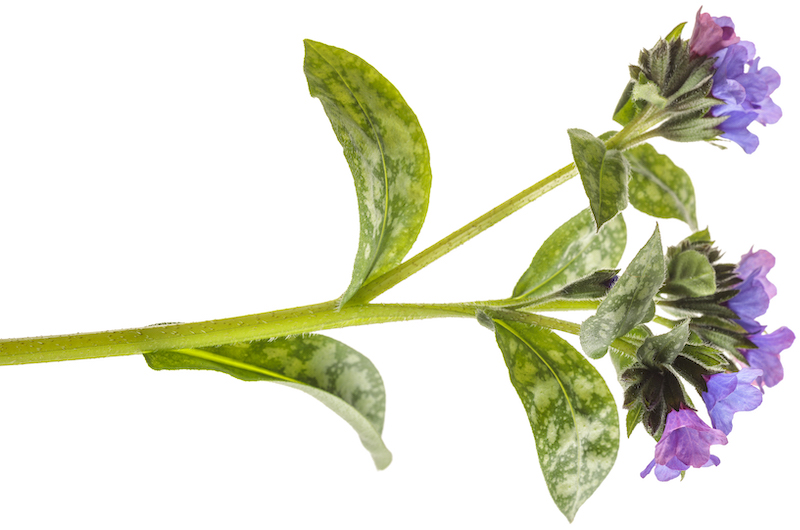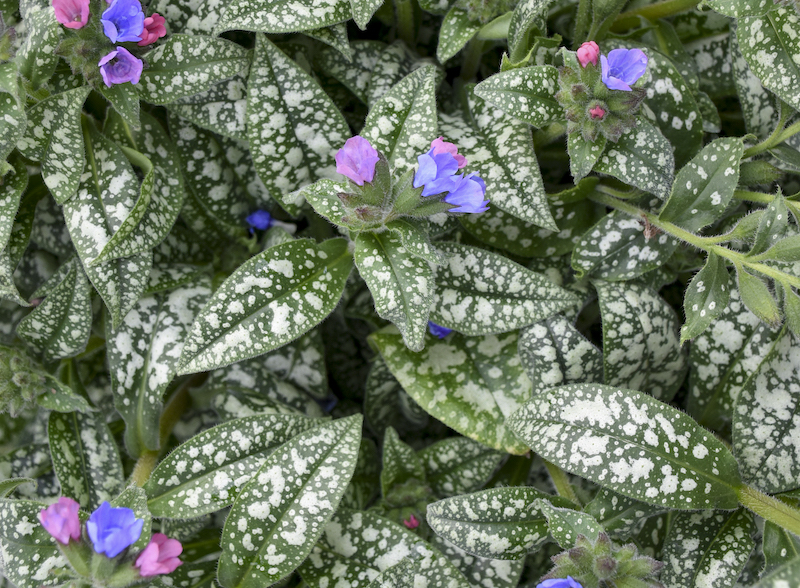Lungwort plants have gently nodding flowers and unique spotted foliage. While this plant has stunning good looks, it is also poisonous, so be careful when including it in your landscape, especially if you have young children or pets. Some varieties of Lungwort plants are not toxic, but most are, so it's best to be safe and treat all plants as if they are dangerous. All parts of the Lungwort plant are harmful if eaten.

Are Lungwort Poisonous to Children?
The Lungwort plant's stems, leaves, and flowers are harmful to children if eaten. Some Lungwort plants have a history of medicinal use, but most are unsafe and contain toxic chemicals. Touching the plant is not dangerous, but eating any part of the Lungwort plant can cause blurred vision, dry mouth, urinary tract problems, dizziness, confusion, and partial paralysis.
Are Lungwort Poisonous to Dogs?
Lungwort plants are toxic to dogs of all ages. The entire plant contains poisonous chemicals, including saponins and pyrrolizidine alkaloids. Canines that eat Lungwort may experience loss of appetite, lethargy, vomiting, diarrhea, and even difficulty walking, or neurological problems.
Are Lungwort Poisonous to Cats?
All parts of the Lungwort plant are poisonous to cats. The stems, foliage, and flowers contain saponins and pyrrolizidine alkaloids. Eating Lungwort plants can cause adult cats and kittens to experience loss of appetite, lethargy, vomiting, and diarrhea. In extreme cases, the feline may have difficulty walking and may experience neurological issues.

Are Lungwort Poisonous to Other Animals?
Lungwort is poisonous to most animals. The stems, foliage, and flowers contain saponins and pyrrolizidine alkaloids, which are toxic chemicals. Lungwort plants are not likely to entice grazing or foraging animals, but eating any part of the plant can be harmful.
Symptoms Of Lungwort Poisoning
Eating the Lungwort plant can be very harmful and dangerous to people and animals. Be aware of the dangers when including this plant in areas accessible to young children, pets, and livestock. Always check with your doctor or veterinarian for guidance if you suspect Lungwort poisoning.
Here are some common symptoms to look out for:
- Loss of appetite
- Lethargy
- Vomiting
- Diarrhea
- Mobility issues
- Neurological problems
Preventing Lungwort Poisoning
Protect little ones and pets from Lungwort poisoning by substituting this plant with a safe alternative. Fences and physical barriers can protect children and pets or plant Lungwort in inaccessible areas, so the plant is out of reach.
Pet Poison Helpline
If something were to happen to your furry friend, and you suspect that they are suffering from Lungwort poisoning, there is a poison control hotline to call for 24/7 vet advice. It is called the Pet Poison Hotline, and their phone number is (855) 764-7661.
Sources:
"Pulmonaria longifolia." The North Carolina Extension Gardener Plant Toolbox. plants.ces.ncsu.edu
"Pulmonaria officinalis." The North Carolina Extension Gardener Plant Toolbox. plants.ces.ncsu.edu
 |
Author Alison Cotsonas - Published 05-10-2023 |
